James Miles
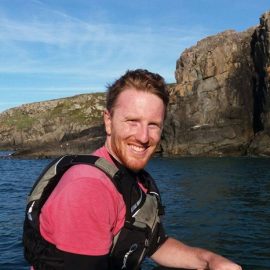 I graduated with a BSc in Biology from the University of St Andrews in 2014 and continued on to do an MSc in Marine Mammal Science. In 2016, I started a PhD in Sustainable Infrastructure Systems at the University of Southampton. I graduated with a BSc in Biology from the University of St Andrews in 2014 and continued on to do an MSc in Marine Mammal Science. In 2016, I started a PhD in Sustainable Infrastructure Systems at the University of Southampton.
My research interests cover the ecological impact of human disturbance, animal behaviour and underwater acoustics. Currently, my research focuses on how human activities, in particular the development of renewable energy, can affect animal behaviour and how animals use cues in their environment to navigate. I am excited to work alongside the renewable energy industry throughout my PhD.
My research project will be on small scale hydropower facilities can provide a clean and reliable energy source to help achieve societies growing energy needs. However, the associated dams and weirs are unfamiliar obstacles to migrating fish species, altering the environment and the natural cues used by fish to navigate.
The primary aim of my project is to quantify the influence of small-scale hydropower facilities on the movement and survival of freshwater fish. A secondary aim is to develop recommendations for potential mitigation options to protect fish at small-scale hydropower sites. |
Nicholas Wilding
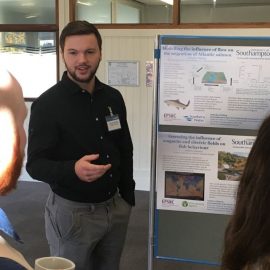 Nicholas graduated from Loughborough University with a BSc (Hons) in Geography (2012-2015) and a Masters degree in Environmental Monitoring for Management (2015-2016). Previous research has looked to identify the influence of flow permanence and streambed drying (natural hydrological controls) on the community composition of aquatic macroinvertebrates in UK chalk streams, as well as the role of groundwater abstraction practices on macroinvertebrate communities inhabiting temporary rivers for the same region. Nicholas graduated from Loughborough University with a BSc (Hons) in Geography (2012-2015) and a Masters degree in Environmental Monitoring for Management (2015-2016). Previous research has looked to identify the influence of flow permanence and streambed drying (natural hydrological controls) on the community composition of aquatic macroinvertebrates in UK chalk streams, as well as the role of groundwater abstraction practices on macroinvertebrate communities inhabiting temporary rivers for the same region.
Nicholas’ research interests centre around the influence of shifting environmental variables on aquatic fauna, particularly in response to climate change and impact of the Anthropocene, and furthermore, the influence of aquatic fauna on the environment and its processes (ecogeomorphology).
In 2016 Nicholas began an Integrated PhD in Sustainable Infrastructure Systems (CDT-SIS). His project looks to identify the influence of flow and other environmental variables on the migration of Atlantic salmon in chalk streams.
|
Clementine McAteer
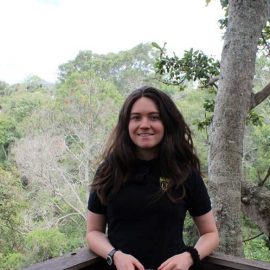 I studied Biological Sciences at the University of Oxford, where I specialised in ecology, animal behaviour and species conservation. My interest in conservation lead me to complete a Masters of Research in Wildlife Conservation at the University of Southampton. The masters gave me invaluable experience of field work in Kenya and laboratory skills. My project was investigating if genetic changes had occurred in a captive breeding programme of threatened Polynesian tree snails. I studied Biological Sciences at the University of Oxford, where I specialised in ecology, animal behaviour and species conservation. My interest in conservation lead me to complete a Masters of Research in Wildlife Conservation at the University of Southampton. The masters gave me invaluable experience of field work in Kenya and laboratory skills. My project was investigating if genetic changes had occurred in a captive breeding programme of threatened Polynesian tree snails.
My main research queries are in conservation biology and evolution. I am interested in finding out the causes of decline in endangered species and testing and evaluating conservation measures. I am particularly interested in species that have either complex life histories or social structures that create challenges to conservation. Moreover as conservation genetics is an essential and often overlooked aspect of conservation, I endeavour to understand the genetic structure of declining populations to help preserve them long term.
My PhD is to explore the causes of decline to the European eel which has declined by 95% in the last 30 years and is critically endangered. I am interested to query the influence of water intake systems and river obstruction on their decline. I also hope to elucidate the structure of the remaining genetic diversity of the eel population. |
Theresa Schoetz
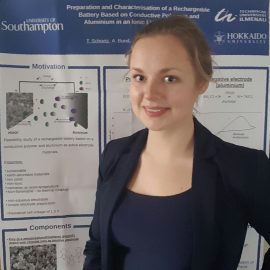 I am iPhD student within Engineering and the Environment at the University of Southampton. My research interests are related to the electrochemistry of energy storage materials and systems like batteries and capacitors. My PhD topic refers to the preparation and characterization of a rechargeable conductive polymer aluminum battery in ionic liquids. I am iPhD student within Engineering and the Environment at the University of Southampton. My research interests are related to the electrochemistry of energy storage materials and systems like batteries and capacitors. My PhD topic refers to the preparation and characterization of a rechargeable conductive polymer aluminum battery in ionic liquids.
I received my Bachelor of Engineering in Chemical Engineering at the BTU Cottbus-Senftenberg University of Technology (Germany) in 2013. In my master studies I focused on Electrochemistry and Electroplating and passed my Master of Science at the Technische Universität Ilmenau (Germany) in 2016.
During my studies I was private tutor for physics and mathematics and worked as working student at AREVA GmbH in Erlangen (Germany) on several electrolysis projects. Furthermore, I was employed as research assistant at Technische Universität Ilmenau on the electrodeposition and characterization of conductive polymers.
Especially my internship at the University of Salento in Lecce (Italy) on cathode materials of conductive polymers doped with metal nanoparticles and my master thesis at the Hokkaido University in Sapporo (Japan), where I studied the feasibility of a rechargeable aluminum- conductive polymer battery in ionic liquids, are important milestones in my scientific career. |
Maria Ramos Suarez
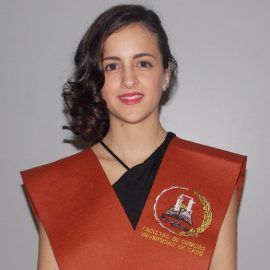 I did my Bachelor’s and Master’s degree in Chemical Engineering at The University of Cadiz (UCA), Spain, and specialised in bioprocess engineering. I also spent my 3rd year at the University of Manchester (UoM). I collaborated with the Analysis and Design of Processes with Supercritical Fluids group (UCA) in two different projects; one about phenolics extraction from mango leaves and the other about biodiesel production under supercritical conditions. During the summer break of my master’s degree I did a research internship within the Biorefinery Engineering group (UoM) on solid state fermentation. Later on, I did my dissertation on bioethanol production from sunflower stalks using ionic liquids (UoM/UCA). I did my Bachelor’s and Master’s degree in Chemical Engineering at The University of Cadiz (UCA), Spain, and specialised in bioprocess engineering. I also spent my 3rd year at the University of Manchester (UoM). I collaborated with the Analysis and Design of Processes with Supercritical Fluids group (UCA) in two different projects; one about phenolics extraction from mango leaves and the other about biodiesel production under supercritical conditions. During the summer break of my master’s degree I did a research internship within the Biorefinery Engineering group (UoM) on solid state fermentation. Later on, I did my dissertation on bioethanol production from sunflower stalks using ionic liquids (UoM/UCA).
My research interests cover biorefineries, bioprocessing, waste management/recycling and waste water treatment.
Currently, I am working on Integrated Biorefinery Products from Wastes and Residues, a project sponsored by Fiberight Ltd. This project will focus on the improvement of the Fiberight process downstream for biogas and/or bioethanol production.
|
Boniface Hima
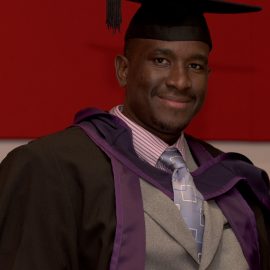 I came to in UK 2006 from Tanzania and later on join the British Army’s Royal Engineer corps as a specialist driver, where I served for 5 years and left in 2012 to pursue further education. I graduated in 2015 from Southampton Solent University with BSc (Hons) in Sound Engineering and was awarded scholarship to attain an MSc in Applied Acoustics, I graduated in 2016 at the same university. I successfully secured a part-time job as assistant acoustics consultant while attaining MSc. I came to in UK 2006 from Tanzania and later on join the British Army’s Royal Engineer corps as a specialist driver, where I served for 5 years and left in 2012 to pursue further education. I graduated in 2015 from Southampton Solent University with BSc (Hons) in Sound Engineering and was awarded scholarship to attain an MSc in Applied Acoustics, I graduated in 2016 at the same university. I successfully secured a part-time job as assistant acoustics consultant while attaining MSc.
While working as assistant consultant, I was involved in varieties of projects that involve noise reduction. The projects gave me exciting passion in finding the best ways of creating a solution to the problems that associated with noise.
My project is entitled “Track Noise Mitigation”. This project is jointly funded by The Engineering and Physical Sciences Research Council and Track to the future. The aim of the project is to carry out computer modelling combining rolling noise and ground-borne vibration to design a low noise/ low vibration track. |
Toshan Rampat
 Toshan Rampat’s research is in fundamental soil mechanics, granular behaviour and numerical modelling. More specifically, the research involves the coupling of finite element models and discrete element models in order to simulate the behaviour of high-speed trains on ballasted tracks. He is currently involved in the project TRACK TO THE FUTURE (T2F) where he is developing new forms of railway sleepers. Toshan Rampat’s research is in fundamental soil mechanics, granular behaviour and numerical modelling. More specifically, the research involves the coupling of finite element models and discrete element models in order to simulate the behaviour of high-speed trains on ballasted tracks. He is currently involved in the project TRACK TO THE FUTURE (T2F) where he is developing new forms of railway sleepers.
After graduating from the University of Nottingham with a Bachelor in Civil Engineering in 2015, he pursued one year of research, as a Geotechnical research and teaching assistant, for the project: From Conventional to High-Speed, which involved the investigation of various types of reinforcement schemes using 3D-geocomposite materials on ballasted for rapid transit applications.
His professional experience includes design of shallow foundations using Eurocode 7 and on-site supervision. He has previously worked with Pad&co Ltd, Hyvec Partners Ltd and LuxConsult Ltd.
He was awarded the Best Paper Award at the ICCEASCM 2016 conference held in Kuala Lumpur. |
Jack Callaghan
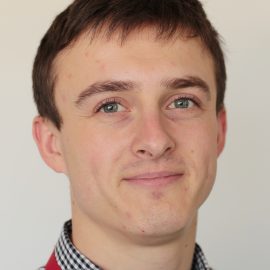 Jack graduated from the University of Northumbria at Newcastle in 2016 with an MEng in Mechanical Engineering, from which he won the Frederic Barnes Waldron Award provided by the IMechE. This degree included a year in industry where he worked as a project engineer at a steel plate rolling mill in Gateshead. Jack graduated from the University of Northumbria at Newcastle in 2016 with an MEng in Mechanical Engineering, from which he won the Frederic Barnes Waldron Award provided by the IMechE. This degree included a year in industry where he worked as a project engineer at a steel plate rolling mill in Gateshead.
Jack is working towards an iPhD on the topic of high-fidelity testing of wind turbine blade components and sub-structures within the infrastructure research group. This will encompass aspects of composite mechanics and failure characterisation by evaluating numerical models and conducting real-scale load tests.
The sponsors of Jack’s project are the EPSRC and Siemens Wind Power.
|
Michael Andrews
 Starting from a background in civil engineering, Michael is beginning research in to anaerobic digestion, with a current focus on the importance of trace elements to the digestion process. Previous research projects he has been involved with have included the gasification of municipal solid waste, and the recycling of fuel cells. He is interested in almost any project relating to the water-energy nexus, and sustainability in general. Starting from a background in civil engineering, Michael is beginning research in to anaerobic digestion, with a current focus on the importance of trace elements to the digestion process. Previous research projects he has been involved with have included the gasification of municipal solid waste, and the recycling of fuel cells. He is interested in almost any project relating to the water-energy nexus, and sustainability in general.
|
Ali Shahbaz Khan
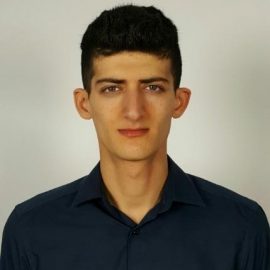 I graduated with BEng in Mechanical Engineering (2015) and MSc in Chemical and Petroleum Engineering (2016) from the University of Bradford. I graduated with BEng in Mechanical Engineering (2015) and MSc in Chemical and Petroleum Engineering (2016) from the University of Bradford.
My research project ‘Correlating ballast stiffness/settlement and sub-ballast behaviour with trackbed performance and maintenance needs’, is part of an EPSRC sponsored research programme, “Track to the Future (T2F)”. The project aims to contribute towards an efficient and robust railway track with improved performance prediction and maintenance planning. |